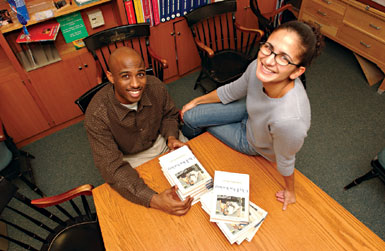Vital Signs
Students strive to cultivate a different kind of competency
Roy Wade and Shirin Sioshansi, both second-year students at DMS, complement each other well. He describes himself as "laid-back"; she says she's "more assertive." She's petite; he's tall. He's African-American; she's Persian. Yet the two share a common passion and goal: to increase the cultural awareness of their classmates.
Awareness: Sioshansi, a member of the Dartmouth College Class of 2000, became interested in cultural awareness when she was an undergraduate, while doing an independent study on the history of African-Americans in medicine.

|
|
Second-year medical students Roy Wade and Shirin
Sioshansi received a Schweitzer grant to develop a
program that's aimed at increasing their fellow students'
awareness of the impact of culture on care. |
In the process of her research, Sioshansi says, she learned about "many atrocious things," such as the Tuskegee Experiment—a study of untreated syphilis in black males that continued for 32 years after the disease could be cured with penicillin.
As a result, she came to realize, there is a lack of trust for physicians in some cultures— something that she feels every medical student should understand.
Wade has come to agree with her. "Being an African-American," he says, "I've seen a lot of these racial experiences, and I just accept it as the way it is. Shirin will see something and say, 'That's just wrong,' and I'll say, 'That's just life.'
"She's inspired me not to accept things that are wrong."
So the two of them teamed up to develop what they called a Cultural Competency Program. The project was funded in part by a grant from the Schweitzer Foundation, and its offerings are spanning this academic year.
The first event— held during orientation week last summer for first-year medical students— was a discussion of Ann Fadiman's National Book Awardwinning chronicle, The Spirit Catches You and You Fall Down: A Hmong Child, Her American Doctors, and the Collision of Two Cultures. In October, Wade and Sioshansi organized a workshop on social styles.
Inequities: In November, they held mock interviews where students could take medical histories from Hispanic and Russian volunteers, followed by a discussion about 20/20 and Nightline episodes on racial inequities. And in February, they helped organize a library grand rounds on cross-cultural resources; for a list, see http://www.dartmouth.edu/~biomed/resources.htmld/culturalcomp.shtml.
The pair would like to see such offerings become part of the regular curriculum. According to their proposal for the Schweitzer Foundation grant, "a cultural competency program at DMS will help to foster the development of empowered physicians capable of meeting medical challenges facing those of diverse cultural backgrounds." Their proposal stated several specific goals: "to educate future physicians on the health disparities among different ethnic groups; to explore how different cultures view medicine and healing; and to explore how to bridge cultural gaps between physicians and patients."
Although they used the term "cultural competency" in their proposal, Sioshansi and Wade now feel that "cultural awareness" better fits their objectives. "We want to empower our classmates," says Sioshansi, "without them having to learn every detail about every culture."
Imparting: There is actually a risk in imparting too much information, notes Wade. A physician can approach a patient with too many preconceptions based on the patient's membership in a certain culture—and be as biased as the physician who knows little. Their challenge, then, is to build awareness that cultural differences exist but that not all members of a culture will respond the same way.
"You have to know how to talk to the patient," says Wade. "But at the same time you have to know . . ." He pauses, searching for the right word. "How to get information," finishes Sioshansi.
The program has been well received, with as many as 40 to 50 students attending each session. Wade and Sioshansi are grateful to a number of advisers—including in DMS's Office of Multicultural Affairs, which made it possible to provide food at most sessions. "That really helps with attendance," says Sioshansi.
Plans: Wade has another two years at DMS. After he graduates, he plans to combine his M.D. with the Ph.D. in microbiology from Georgia Tech that he already holds and do research and perhaps teach at an innercity hospital.
Sioshansi is in the Brown- Dartmouth Program, so in June she'll be heading for Providence, R.I., to finish her last two years of medical school. Upon graduation, she'd like to work in an underserved urban area as well.
In the meantime, both of them are pleased that two current first-year students have expressed an interest in taking over their program.
"We hope to instill curiosity and appreciation," says Wade of their year-long project.
"We're not trying to get everyone to learn everything about all cultures," adds Sioshansi. "Just to know that there are differences and that it's really okay to ask someone about their religion or why they fast. It really is okay."
Katharine Fisher Britton
